South African mayor proclaims COVID-19 “cure,” discourages reading news headlines
Dubious promise of interferon as a
South African mayor proclaims COVID-19 “cure,” discourages reading news headlines
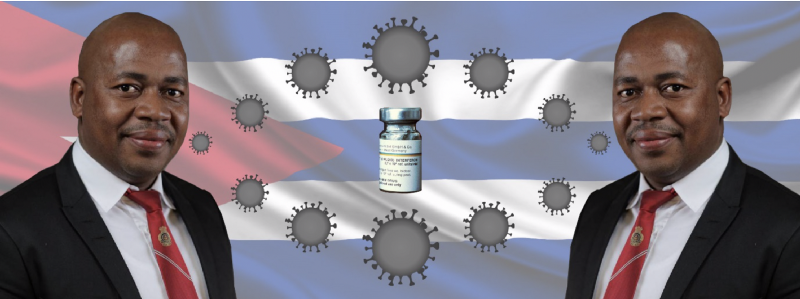
Dubious promise of interferon as a vaccine another example of politicians touting misinfo amid the pandemic
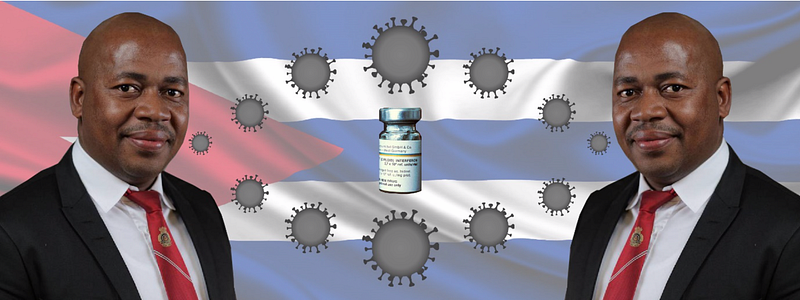
This article is part two in a two-part series on how the claim that Cuba had developed a vaccine for COVID-19 spread around the world. Part one focuses on the false claim’s spread across Latin America.
The mayor of Ekurhuleni, South Africa, told residents during a March 18, 2020 speech that the city would proclaim the drug interferon as a COVID-19 vaccine and announced he would procure it from Cuba. After Twitter users informed the mayor that a COVID-19 vaccine does not exist and interferon, an anti-viral produced by a Cuban-Chinese joint venture ChangHeber, is not a “cure” for COVID-19, he doubled down and told users not to read news headlines.
Mayor Mzwandile Masina is not the first to claim interferon was a vaccine for COVID-19. After Cuba announced that the drug was being used in China as part of treatment for COVID-19 patients, the story spread among leftists in Latin America, reaching the trending topics in Brazil on March 12.
The mayor was also not the first politician to jump the gun and promise citizens access to unproven drugs during the current outbreak. On March 19, U.S. President Donald Trump promised that chloroquine, an anti-malaria drug that has been hyped up as potential treatment for COVID-19, would be available for prescription in the United States “almost immediately.” Since then, at least one man in the United States has died from ingesting a non-medicinal form of the substance after reportedly watching Trump’s televised remarks touting the drug, while three Nigerian citizens overdosed after Trump endorsed it as a COVID-19 treatment. And on April 24, the US Food and Drug Administration warned that use of the drug in certain circumstances may cause death due to heart rhythm problems.
False information about quack cures, vaccinations and remedies for COVID-19 abound on social media platforms as well as private messaging apps. These fake cures are so prevalent that a Google search for “coronavirus cures” now returns a COVID-19 alert from the U.S. Centers for Disease Control and Prevention (CDC) saying, “There is no specific medicine to prevent or treat coronavirus disease (COVID-19).”
Interferon Alpha-2B: Cuba’s miracle cure?
On March 17, South Africa’s National Education, Health and Allied Workers’ Union (NEHAWU) issued a statement calling for the South African government to procure interferon from Cuba “for the treatment of COVID-19.” Included in the statement was a claim that “interferon has cured more than 1,500 patients.”
This particular claim was originally published by Cuba’s state-run newspaper, Granma, on February 6. As previously reported by the DFRLab, the narrative then traveled across multiple Latin American countries, with one significant change: interferon was referred to as a vaccine, rather than a drug, in news headlines.
In the weeks leading up to NEHAWU’s statement, stories about a Cuban vaccine had already been picked up by left-aligned social media accounts in Latin America, so much so that “Cuban vaccine” started trending in Brazil. Yet NEHAWU’s call for Cuban medication received little attention in South Africa.
The call was tweeted by the Congress of South African Trade Unions (COSATU), the largest trade union federation in the country. Although COSATU has over 143,000 Twitter followers, the tweet mentioning interferon only garnered a meager four likes and one retweet.
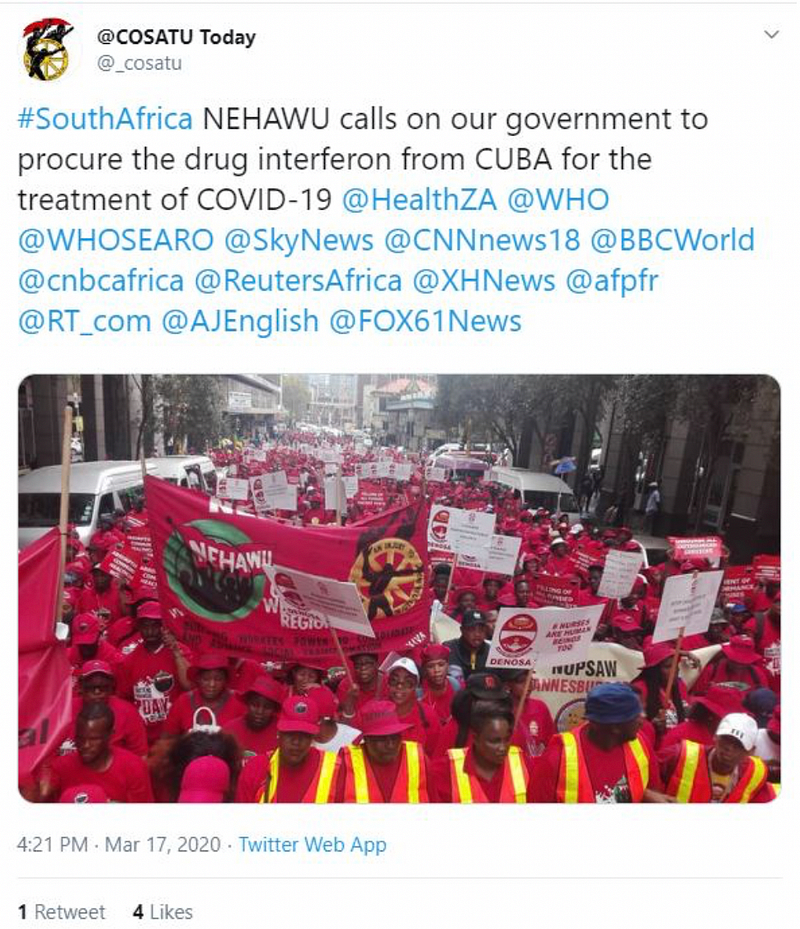
The statement was also republished on the Cuban Embassy in South Africa’s Facebook page in both English and Spanish, and was tweeted by ANC politician Carl Niehaus. In both instances, the statement and call for the ANC government to purchase interferon from Cuba garnered little support.
But a day later, Ekurhuleni Mayor Mzwandile Masina posted a picture of interferon Alpha-2B to his Twitter account, where he has nearly 100,000 followers. Ekurhuleni has a population of some 3.4 million people.

A few hours later, Masina said the following during his State of the City address:
As part of the city’s immediate contribution to curb the coronavirus in our space we have resolved to use our emergency funds to procure the vaccine interferon B from Cuba and other related medicine and vaccines elsewhere so that we can ensure that the current state is kept. Obviously, this is subject to approval of the medical control council, which is the relevant authority, which will actually have to give us permission to go ahead. (emphasis added by the DFRLab)
The speech was livestreamed due to gathering restrictions to limit the spread of COVID-19.
Taking to Twitter after his speech, Masina doubled down on his statement, telling critics not to read news headlines and rather read his speech in its entirety. The DFRLab could not find a readily available copy of the Mayor’s speech, and instead transcribed it from the livestream. The mayor emphasized that Ekurhuleni had made funds available to support the national government in its endeavors to stop the spread of the novel coronavirus, rather than going ahead and purchasing the drug for the city alone.
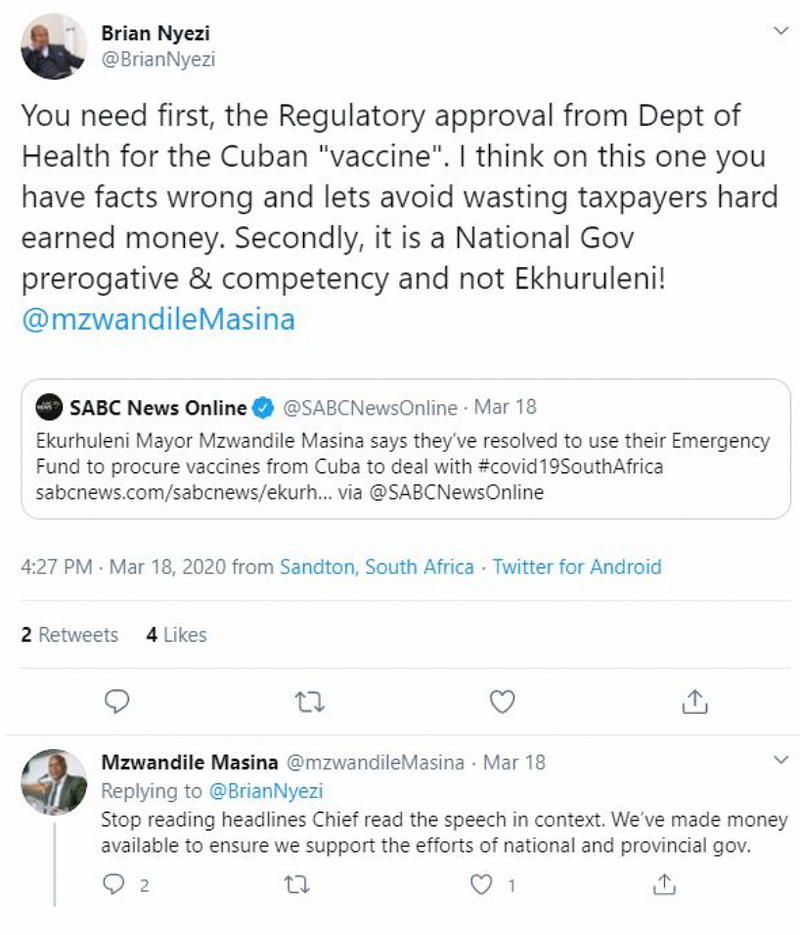
When asked if he consulted the provincial government before announcing he would purchase the alleged vaccine and other drugs from Cuba, Masina replied that he had checked with the appropriate leadership, in particular a member of the Executive Council for Health in Gauteng, the province in which Ekurhuleni is located.
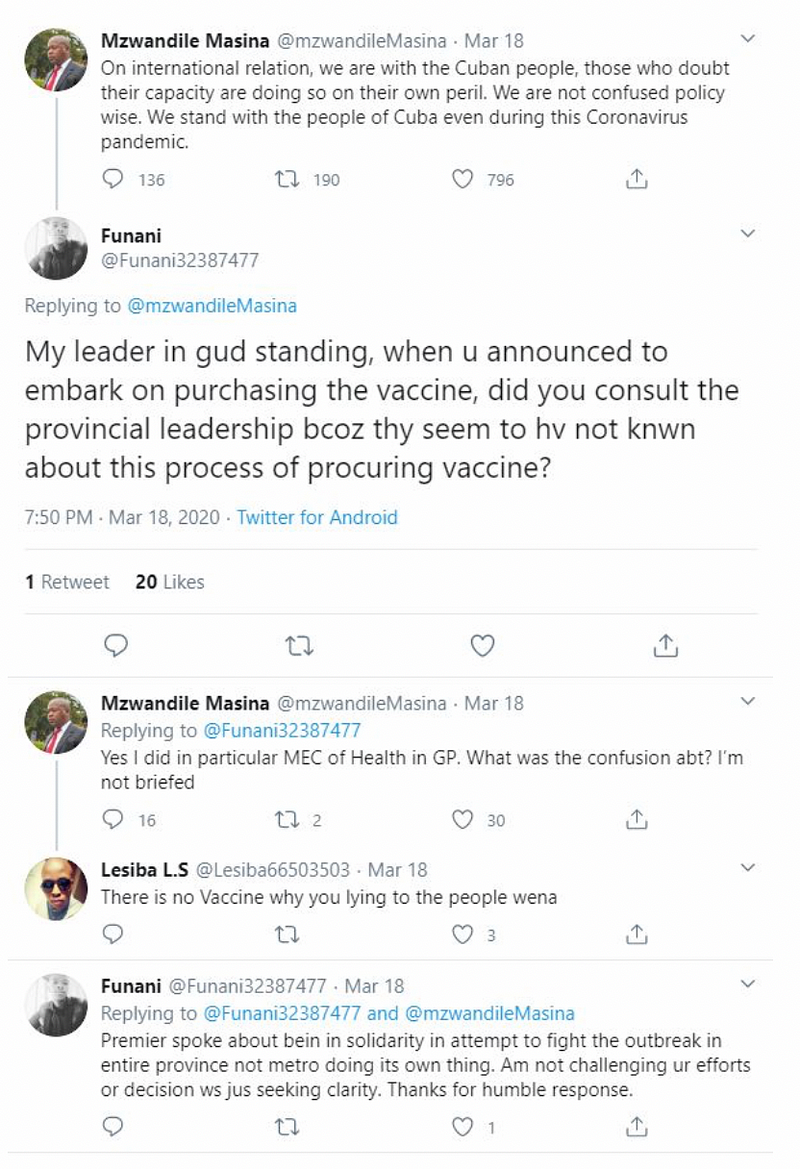
The same day Masina claimed he had corresponded with the relevant health authority, the South African Health Products Regulatory Authority (SAHPRA) stated that no drug to treat COVID-19 had been approved by any international health body, and that even the minister of health does not have the authority to approve a drug without SAHPRA’s backing. Meanwhile, WHO announced on March 18 it would begin a trial to jumpstart the search for a treatment for COVID-19. Known as the Solidarity Trial, WHO Director General Tedros Ghebreyesus announced that South Africa would be one of the many countries participating in the trial.
Despite the South African government signing up to research treatments for COVID-19, Masina appeared to endorse interferon as a miracle cure for the novel coronavirus in a now-deleted tweet, claiming that Cuba did, in fact, have medicine that could cure the virus. Since deleting the tweet, Masina has not referred to interferon as a cure for the novel coronavirus but has remained an avid supporter of the drug.
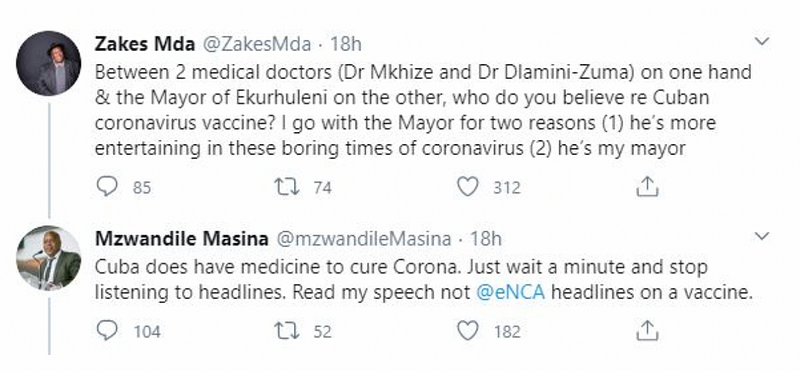
On March 20, the mayor posted a picture with the Ambassador of Cuba to South Africa, Rodolfo Verson, claiming to have been briefed on interferon Alpha-2B and other drugs that assisted China, Venezuela, and Brazil in their fight to “treat and stabilize COVID-19,”despite no public announcement from the national government on the matter.
A week later, Masina became involved in a Twitter spat with the Organisation Undoing Tax Abuse (OUTA) after OUTA published a link to a news article debunking Masina’s claim warning citizens to watch what politicians do with municipal funds. Masina immediately went on the defensive, posting multiple links to fringe websites extolling the virtues of interferon. After alleging that the organization was anti-Cuba, Masina tweeted that he may have made a mistake by calling a drug a vaccine. But minutes later the mayor doubled back, questioning what part of his statement could be deemed “fake news” and claiming he stood by everything he said during his speech.
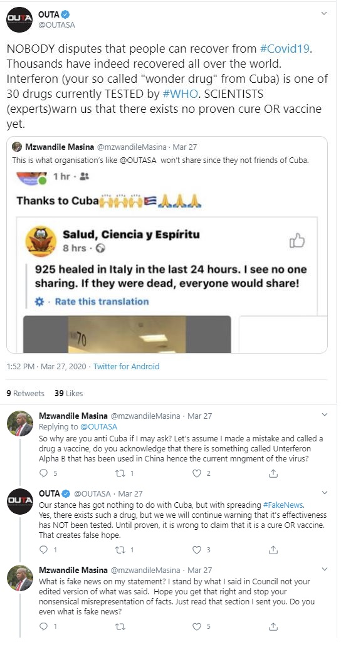
Masina also claimed that he was under attack by “US puppets” in a March 28 tweet, after linking to an article by the left-aligned British newspaper, Morning Star. The article also mentioned that interferon was effective in treating 1,500 Chinese patients, and claimed the U.S. was actively pressurizing countries not to accept Cuban aid. Masina appears to have insinuated that the reason he was being attacked on Twitter for his statements about interferon is because U.S. anti-Cuban puppets were after Cuban supporters.

On March 31, Masina again chose to maintain that he had not done anything wrong when the Twitter account for the Democratic Alliance (DA) in the same province as Ekurhuleni tweeted that the Mayor gave false hope to his residents and should apologize. Masina responded by saying he would not apologize for his statements.
Looking to Cuba for answers
In the days and weeks following Masina’s initial tweets, left-aligned South African Twitter accounts started looking to the communist country for relief, using it as evidence of the failures of capitalism.
Members of the Economic Freedom Fighters (EFF), South Africa’s third-largest political party and largest far-left party, supported Masina’s call for Cuban medication. Most prominently, the EFF’s head of international relations, Godrich Gardee, said that white-owned South African businesses would not allow the government to buy medicine from a country like Cuba, implying a capitalist agenda would get in the way of purchasing medicine from a communist country. He invoked the divisive term “white monopoly capital,” and also insinuated that the ANC government led by President Cyril Ramaphosa protects the interests of these businessowners.
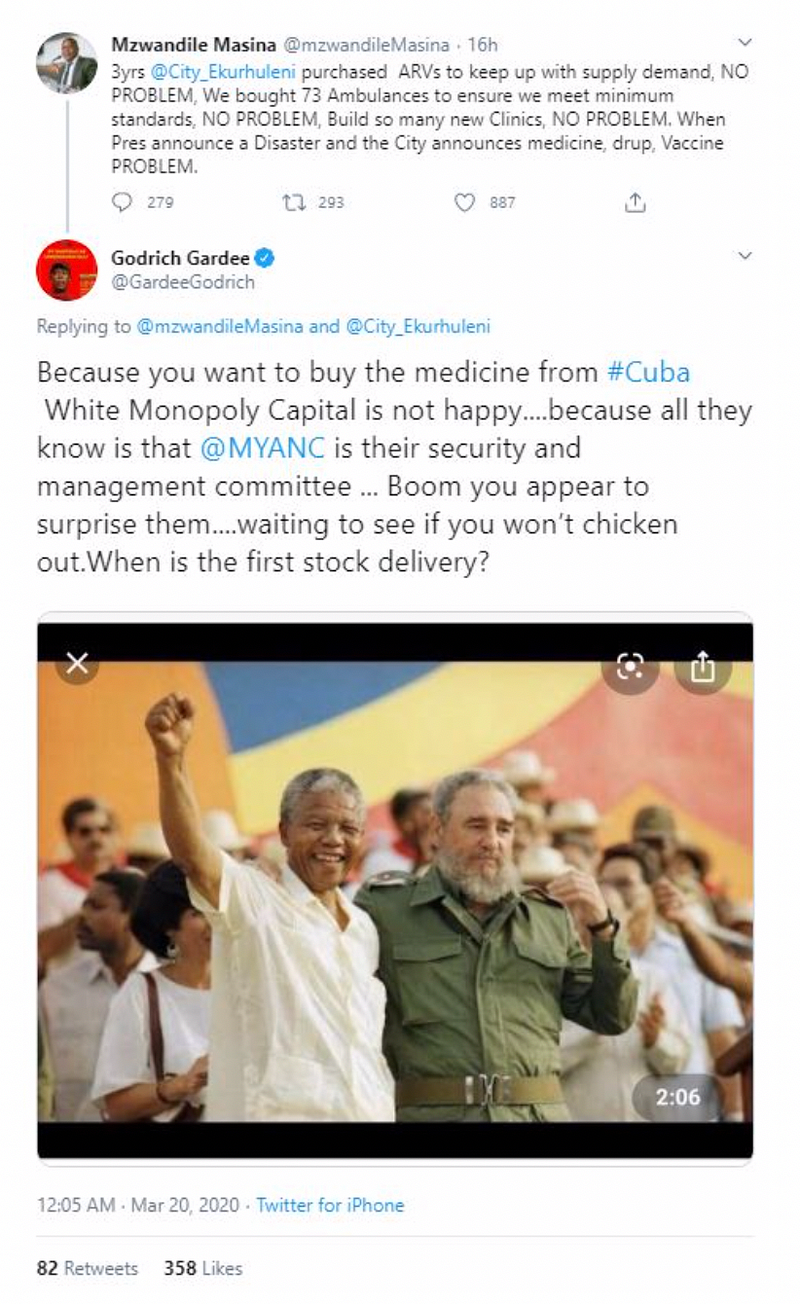
Another member of the EFF, Nazier Paulson, also tweeted his support for buying the Cuban medicine on March 23. Paulson posted a video of EFF second-in-command Floyd Shivambu speaking about the Cuban healthcare system. When asked about vaccines from Cuba, Paulson belittled and swore at the user who questioned him, and posted a link to an article entitled “Cuba’s interferon drug effective against coronavirus” by PM News Nigeria.
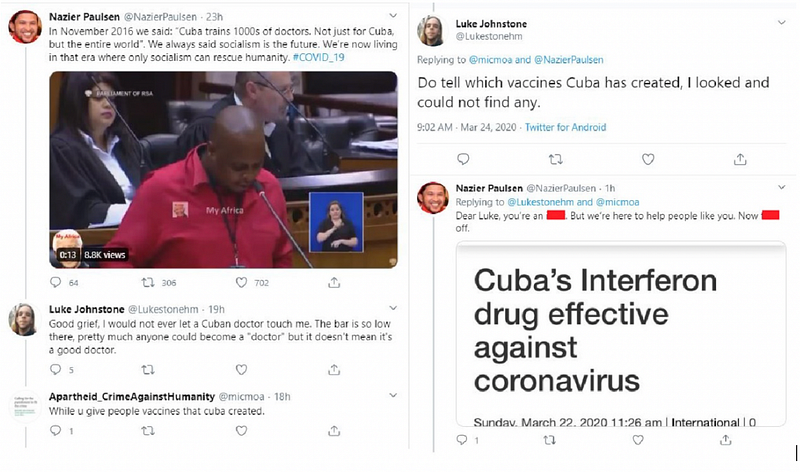
In a similar vein, some Twitter users have implied that the South African government, under President Ramaphosa, will not purchase medicine from Cuba because Ramaphosa’s supporters want to create their own vaccine to sell, and have used Masina’s desire to purchase medicine from Cuba as an indictment of Cyril Ramaphosa and his government. Other comments recycled debunked conspiracy theories to accuse the president of wanting to make money off the virus.
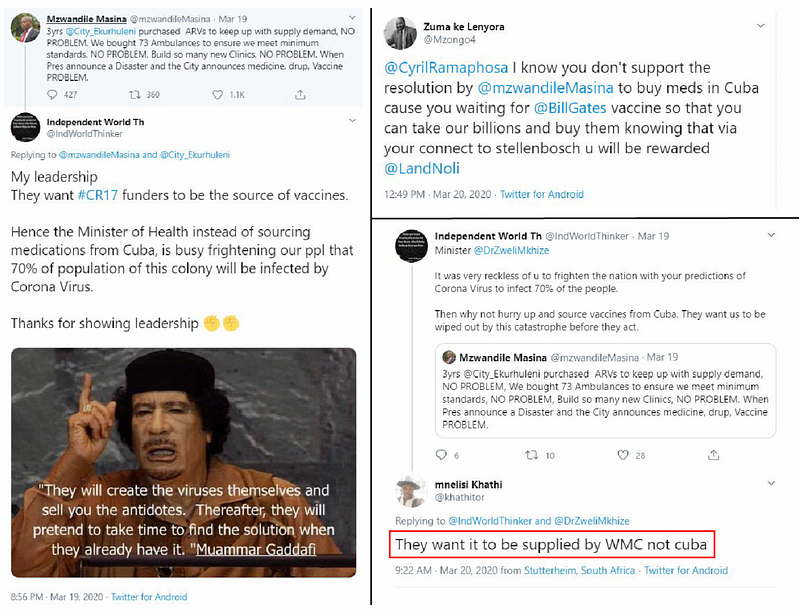
In the weeks following Masina’s initial claims of a Cuban cure, the South African government officially reached out to Cuba and China for assistance in tackling the current spread of the novel coronavirus. In response to this news, Masina again took to Twitter, questioning where all his “haters” were.
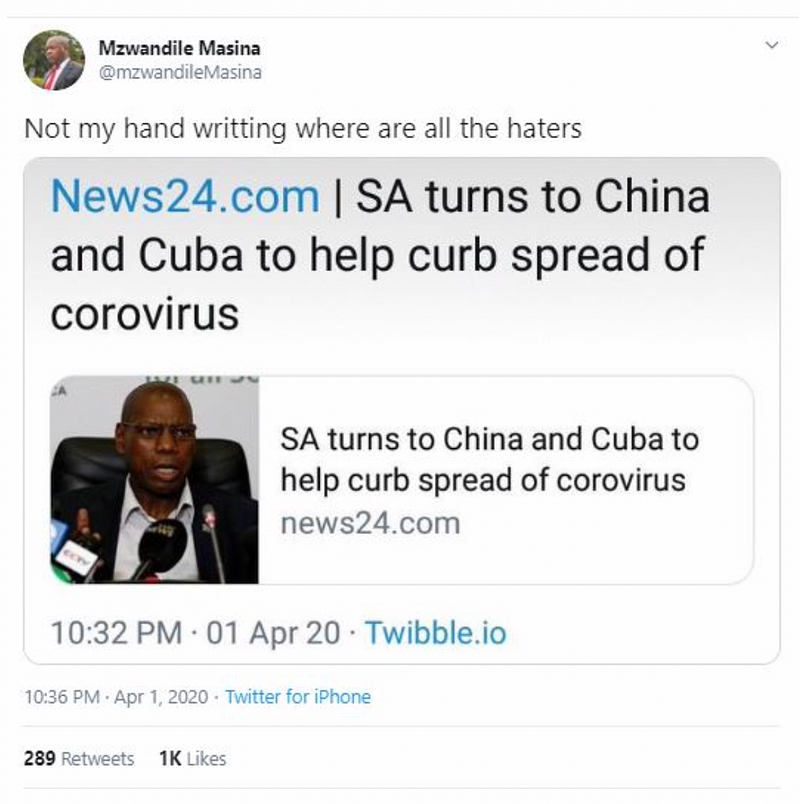
Announcing that the Cuban doctors would officially be sent to South Africa in a tweet, Masina was once more questioned about his alleged Cuban vaccination. In response, the mayor posted a picture of the Cuban Ambassador to South Africa, asking the user who had questioned the lack of vaccines what the ambassador might have in the boxes. He appeared to be implying that the boxes contained medication, although he clarified that it was not a vaccine.
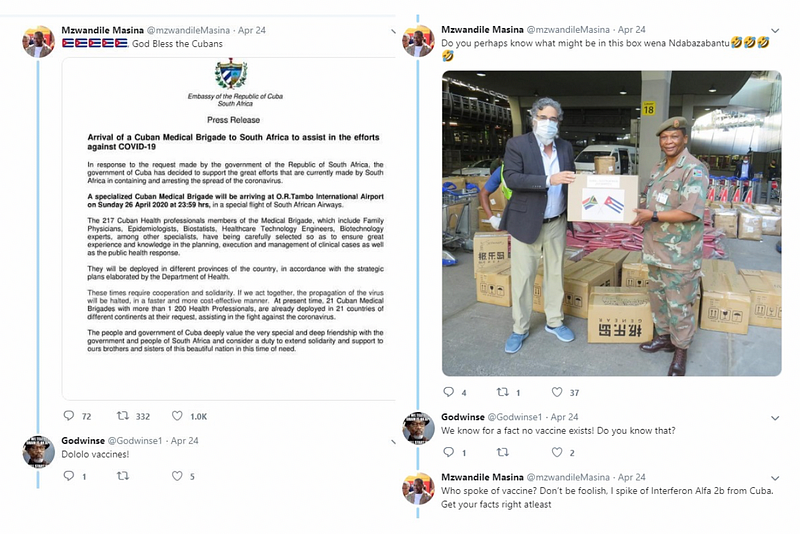
Since his original speech on March 18, Masina has referred to interferon in many ways: a vaccine, a drug, a medicine and, most recently, a molecule. He has repeatedly stated that his speech was twisted out of context by the media, and that his followers should not read newspaper headlines.
Most recently on April 28, the day after more than 200 Cuban healthcare professionals arrived in South Africa, Masina claimed that the reason people reacted so poorly and “made noise” about his desire for Cuban intervention was not because he misused a word. Rather, he claims that an alleged groups of “Masters” created inauthentic backlash because they did not want to acknowledge Cuban medical superiority.
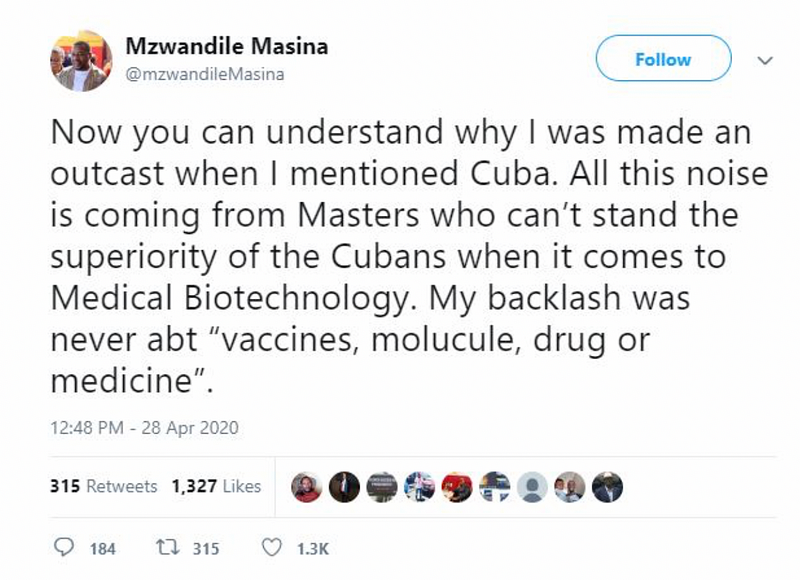
Six weeks after his claim that Cuba had a COVID-19 vaccine in the form of interferon, Masina appears to be sticking to his guns. He has not formally retracted his statement, rather choosing to continue the line that citizens should read his speech and not believe newspaper headlines.
Tessa Knight is a Research Assistant, Southern Africa, with the Digital Forensic Research Lab. The DFRLab team in Cape Town works in partnership with Code for Africa.
Follow along for more in-depth analysis from our #DigitalSherlocks.

